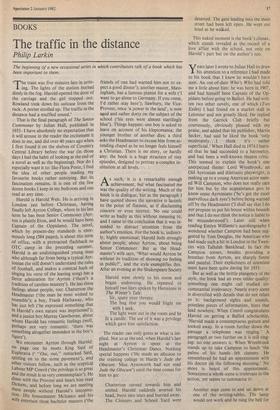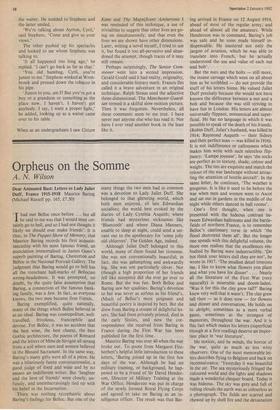BOOKS
The traffic in the distance
Philip Larkin
The beginning of a new occasional series in been important to them. which contributors talk of a book which has "he train was five minutes late in arriv- Ting. The lights of the station burned dimly in the fog. Harold opened the door of the carriage and the girl stepped out. Rowland took down his suitcase from the rack. A porter strolled up. The traffic in the distance had a muffled sound.'
That is the final paragraph of The Senior Commoner by Julian Hall, published in 1933. I have absolutely no expectation that it will arouse in the reader the excitement it does in me, and did over 40 years ago when I first found it on the shelves of Coventry Central Library before the war (in those days I had the habit of looking at the end of a novel as well as the beginning). Nor do I especially want it to: like Flora Poste, I find the idea of other people reading my favourite books rather annoying. But its fascination remains. It is one of the few dozen books I keep in my bedroom and can read at any time.
Harold is Harold Weir. He is arriving in London just before Christmas, having finally left Ayrton College, where in his last term he has been Senior Commoner (Ayr- ton is plainly Eton, and he would have been Captain of the Oppidans). The novel, which by present-day standards is enor- mously long (384 pages), is about this term of office, with a protracted flashback to OTC camp in the preceding summer. Harold is an undistinguished young man who although far from being a typical Ayr- tonian (he still doesn't understand the rules of football, and makes a comical hash of singing his verse of the leaving song) has a fierce admiration for Ayrton (`there's a tradition of careless mastery'). He has these feelings about people, too: Chatterton the Headmaster ('the man he most wished to resemble'); a boy, Frank Hathaway, who has just left ('he expressed something that in Harold's own nature was imprisoned'); and a junior boy Murray Gawthorne, about whom Harold has romantic feelings (well, Perhaps not very romantic: 'there was something altogether immodest in the boy's figure').
We encounter Ayrton through Harold: on page one he meets King Said of Euphratia (' "Oui, oui," remarked Said, spitting on to the stone pavement'), and other visitors follow, such as the sceptical Labour MP Convil (`the privilege is so great and the result is so very commonplace'). He dines with the Provost and hears him read Dickens, and before long we are meeting thesepeople on. without Harold's interposi- tion. His housemaster Mclsaacs and his wife entertain three bachelor masters (`the
friends of one had warned him not to ex- pect a good dinner'); another master, Mass- ingham, has a famous pianist for a wife CI want to go alone to Germany. If you come, I'd rather stay here'); Sawbury, the Vice- Provost, once 'a power in the land', is now aged and rather dotty on the subject of the school (`his eyes were almost startlingly blue'). Things happen: one boy is asked to leave on account of his kleptomania; the younger brother of another dies; a third asks the Headmaster to excuse him from at- tending chapel as he no longer feels himself a Christian. There is no story, or hardly any: the book is a huge structure of tiny episodes, designed to portray a complex in- stitution at all levels.
As such, it is a remarkable enough achievement, but what fascinated me was the quality of the writing. Much of the book is in dialogue, but as the paragraph I have quoted shows the narrative is laconic to the point of flatness, as if disclaiming concern or even interest. No one could write as badly as this without meaning to, and I came to the conclusion that it was in- tended to distract attention from the author's emotion. For the book is, indirect- ly, highly emotional; Harold feels strongly about people, about Ayrton, about being Senior Commoner. But as the Head- master's wife says, 'What would Ayrton be without its tradition of showing no feeling in public?', and the style exemplifies this. After an evening at the Shakespeare Society
Harold went slowly to his room and began undressing. He repeated to himself two lines spoken by Hermione in The Winter's Tale: Sir, spare your threats: The bug that you would fright me with I seek.
The light went out in the room and he lit a candle. The use of it was a privilege which gave him satisfaction.
The reader can only guess at what is im- plied. Not so at the end, when Harold's last night at Ayrton is spent at the Headmaster's Christmas Dance. Nothing special happens ('He made an allusion to the training college in Hardy's Jude the Obscure. Miss Aynsworth had not read Jude the Obscure') until the time comes for him to go:
Chatterton turned towards him and smiled. Harold suddenly averted his head, burst into tears and hurried away. The Cloisters and School Yard were deserted. The gate leading into the main street had been left open. He wept out loud as he walked.
This naked moment is the book's climax, which stands revealed as the record of a love affair with the school, not only on Harold's part but on the author's too.
V ears later I wrote to Julian Hall to draw
his attention to a reference I had made to his book that I knew he wouldn't have seen. An out-of-date Who's Who had told me a little about him: he was born in 1907, and had himself been Captain of the Op- pidans before going to Balliol. He had writ- ten two other novels, one of which (Two Exiles) I had found on a market stall in Leicester and not greatly liked. He replied from the Garrick Club briefly but courteously, obviously pleased with my praise, and added that his publisher, Martin Seeker, had said he liked the book 'only moderately ...I think it's rather superficial.' When Hall died in 1974 I learn- ed that he had succeeded to a baronetcy, and had been a well-known theatre critic. This seemed to explain the book's one unexpected theme: Lord Wrenbrook, an Old Ayrtonian and dilettante playwright, is making up to a young American actor nam- ed Will Campion, who does not really care for him but by the acquaintance gets to know some Ayrtonians (`he's got the most marvellous dark eyes') before being warned off by the Headmaster CI shall say that I do not propose to put his house within bounds and that I do not think the notice is liable to be misunderstood'). Later still when reading Emlyn Williams's autobiography I wondered whether Campion had been sug- gested by Tom Douglas, the American who had made such a hit in London in the Twen- ties with Tallulah Bankhead. In fact the Campion scenes, besides providing a breather from Ayrton, are sharply funny and painful. Their explicitness of intention must have been quite daring for 1933.
But as well as the brittle plangency of the style, the book had an even odder quality: something one might call studied cir- cumstantial irrelevancy. Nearly every scene is diversified with details that do not relate to it: background sights and sounds, pointless pieces of information, hints that lead nowhere. When Convil congratulates Harold on getting a Balliol scholarship, 'Harold made a contemptuous gesture and looked away. In a room further down the passage a telephone was ringing.' A paragraph or two further on it is still ring- ing: no one answers it. When Wrenbrook stands up to take Campion to lunch 'the palms of his hands felt clammy. He remembered he had an appointment with his doctor on the following morning.' No more is heard of this appointment. Sometimes a whole scene is irrelevant to the action, yet seems to summarise it: Another man came in and sat down at one of the writing-tables. The lamp would not work and he rang the bell for the waiter. He nodded to Stephens and the latter smiled.
`We're talking about Ayrton, Cyril,' said Stephens. `Come and give us your The other pushed up his spectacles and looked to see whom Stephens was talking to.
`It all happened too long ago,' he replied. `I can't go back as far as that.'
`You old humbug, Cyril, you're junior to me.' Stephens winked at Wren- brook and pressed down the tobacco in his pipe.
`Junior to you, am I? But you've got a boy or a grandson or something at the place now. I haven't. I haven't got anybody. I say, I want a proper light,' he added, lodking up as a waiter came over to his table.
When as an undergraduate I saw Citizen
Kane and The Magnificent Ambersons I was reminded of this technique, a use of trivialities to suggest that other lives are go- ing on simultaneously, and that even the lives we are shown have other dimensions. Later, writing a novel myself, I tried to use it, but found it too all-pervasive and aban- doned the attempt, though traces of it may still remain.
Perhaps surprisingly, The Senior Com- moner went into a second impression. Gerald Gould said it had reality, originality, and considerable literary merit. Francis Iles called it a brave adventure in an original technique. Ralph Straus used the adjective three-dimensional. The Manchester Guard- ian termed it a skilful slow-motion picture. Then it was forgotten. Nevertheless, all these comments seem to me true. I have never met anyone else who has read it. Nor have I ever read another book in the least like it.



































 Previous page
Previous page